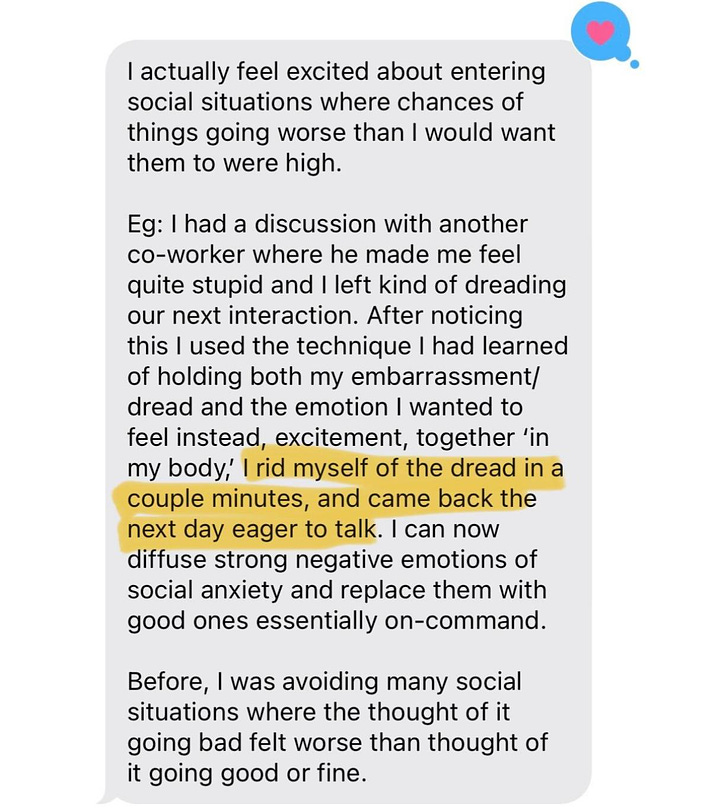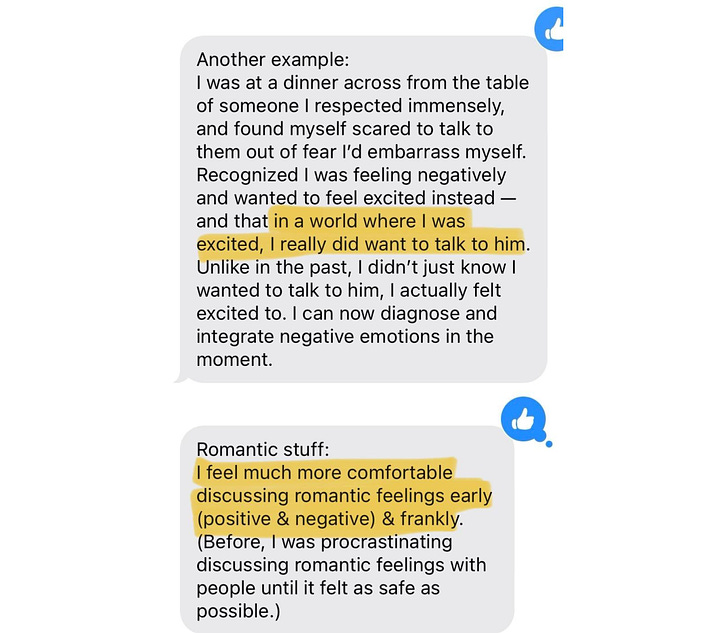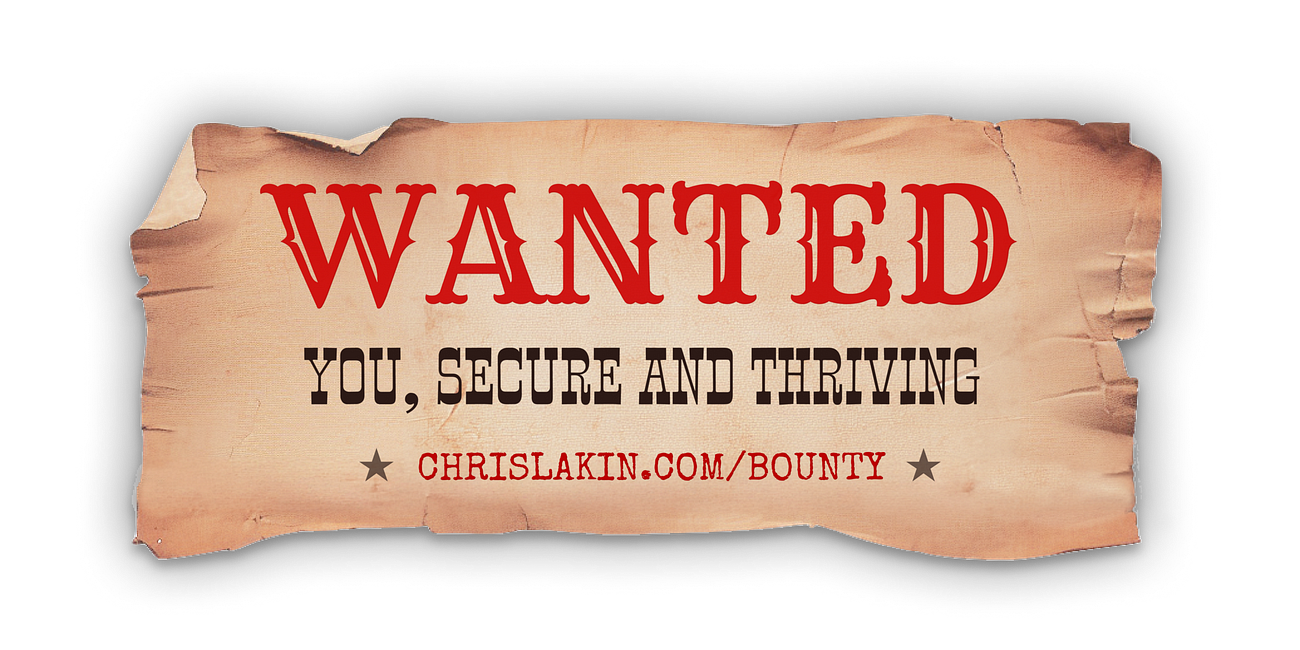A few months ago, I hypothesized, “Radically effective and rapid emotional growth is possible with the right combination of facilitator and method”. E.g.: for resolving anxiety, agency, insecurity, need for validation.
To test my hypothesis, I began a pay-on-results coaching experiment. Clients pay only if they achieve their goal by working with me.
First bounty
Bob (pseudonymous) and I met at Manifest 2024 prediction market conference. Bob told me he had lifelong anxiety, and it was crushing his agency and relationships. He offered a $3k bounty if it could be resolved.
We spoke one day for about four hours.
One month later:
I’m choosing to work on problems beyond my capabilities, and get excited about situations where my weaknesses are repeatedly on display.
I actually feel excited about entering social situations where chances of things going worse than I would want them to were high.


More


(Shared with permission.)
He felt ready to pay his bounty and sent the $3k.
Update 12/3: I’ve checked in with him a few times since and he reports no regression. We’re also going to record a reflection podcast in a few weeks.
Other bounties hunting
A woman working in SF after 3 conversations / 3 weeks:
I went to Chris with a torrent of responsibilities and a key decision looming ahead of me this month. I felt overwhelmed, upset, and I didn’t want just talk
Having engaged in 9+ years of coaching and therapy with varying levels of success, I’m probably one of the toughest clients — equal parts hopeful and skeptical. Chris created an incredibly open space where I could easily tell him if I didn’t know something, or couldn’t feel something, or if I’m overthinking. He also has an uncanny sense of intuition on these things and a strong attunement to being actually effective
The results are already telling: a disappointment that might’ve made me emotionally bleed and mope for a month was something I addressed in the matter of a couple of days with only a scoop of emotional self-doubt instead of *swimming* in self-torture. The lag time of actually doing things to be there for myself was significantly quicker, warmer, and more effective
To-dos that felt very heavy lightened up considerably and began to feel fun again and as ways of connecting!
I’ve now started to predict happier things ahead with more vivid, emotionally engaged, and realistic detail. I’ll continue being intensely focused this year for the outcomes I want, but I’m actually looking forward to it! Will reflect back on Month 2!
An SF founder in his 30s after 1 conversation / 2 weeks:
After working with Chris, I learned One Weird Trick to go after what I really want and feel okay no matter what happens.
This is a new skill I didn’t learn in 3 years of IFS therapy.
I already feel more confident being myself and expressing romantic interest (and I already have twice, that's new).
See the up-to-date list.
Wtf?
“Why does your thing work so unusually well?” asks my mentor Kaj Sotala.
So, it definitely doesn’t work for every person x issue. Because of the bounty structure I’m incentivized to get really good at telling. I can help very well with issues relating to social insecurity, for example, and less well with issues of lack of agency about growth itself.
Why does it work unusually well for the ones it works for?
Firstly, I don’t know. I actually haven't studied other methods much.
But here are some things I can recall clients have been surprised by:
I don’t dig into trauma or ask much about the past. I focus on what the client is predicting in the present.
I don’t linger what the client bad things that the client doesn’t want — I direct them to what they do want for the things in your control.
I don’t try to convince them that their fears are irrational. I focus on making fears okay even if they do happen.
I don’t give object-level advice. Instead, mostly just Socratic Questioning.
I don’t speak that much. I try to say as little as possible, actually. At one point I think I got down to 3–7% speaking but I might be at like 15% now. Mostly I just try to get them to process efficiently.
I don’t cut off sessions because of timing. I allow them to come to a natural end. Sessions have ranged from 15 minutes to 4.5 hours.
I take inspiration from Predictive Processing: “the brain is a multi-layer prediction machine” (Scott Alexander). See Book Review: Surfing Uncertainty | Slate Star Codex and also Multiagent Models of Mind by Kaj Sotala.
I help clients integrate the predictions they want.
This post also describes my thinking well:
What do I actually do?
One of the things I do is somewhat similar to the process outlined in this post:
Mainly (roughly) something like:
“What would you like (for the things in your control?)”
Feeling that somehow.
Ask the feeling: “What bad thing happens?” & listen.
“How would you like to address that?”
If necessary, I ask Socratic Questions from my tacit knowledge.
Return to step 2.
Also I help clients stress-test their new models to notice and integrate blocks that will come up in everyday life before they happen.
Sometimes clients learn how to do the whole process on their own which is pretty cool.
In a way, I’m just teaching them how to introspect in a way that actually results in growth.
Alternative explanations
So far I’m seeing data that’s strongly in favor of it being easy for me to facilitate rapid growth for a certain kind of person and issue. But am I missing something here? If you have any ideas please let me know in the comments.
I’m definitely watching out for regression of growth over time, but I haven’t really seen it yet.
You next?
Thanks to Kaj Sotala, Stag Lynn, and Ulisse Mini for reviewing. Thanks to Kaj Sotala, Brian Toomey, Alex Zhu, Damon Sasi, Anna Salamon, and CFAR for mentorship and financial support
Tweet thread, @ChrisChipMonk, chris@chrislakin.com, chrislakin.com/now










If you ever have an idle want for a disciple or apprentice or employee or something, please contact me. I'd really be interested in being able to help people like this.